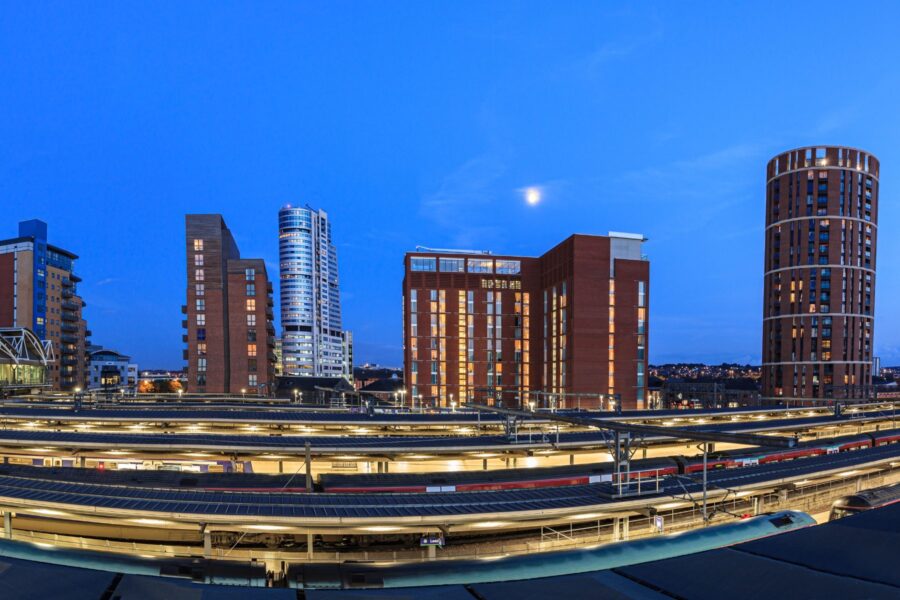
The eastern leg of the HS2 development to Leeds has been scrapped but what does this mean for levelling up the North? ‘Levelling up’ sounds like a great term but what does it mean and what is actually being done about it?
Levelling up promises to inject life into towns and cities that have been left behind for decades to balance the social and economic potential of the United Kingdom. The Government says that it wants to make the biggest changes to the way it supports local economic growth in a decade, in order to regenerate town centres and high streets, support individuals into employment, improve local transport links and invest in local culture while giving communities a stronger voice to take over cherished local assets that might otherwise be lost. How will it be delivered in a meaningful way?
There is a new aptly named Government department, with the Ministry of Housing, Communities & Local Government changing its name to the Department for Levelling Up, Housing & Communities (DLUHC). The name of the department puts levelling up front and centre – a good start you might think. From the time the levelling up agenda was introduced in 2019, as a key part of the Conservatives’ 2019 manifesto, it has taken over two years for the Government to create the new department. The Government has understandably been busy with the pandemic, but the events of the past two years have only further highlighted the regional disparities in Britain.
As of yet, there is little evidence to suggest that levelling up is any more than just a slogan. Within the property and development sector, there is increasing concern around the lack of concrete proposals and policies. The promises that were made have so far not come to fruition. A focus on comprehensive investment in towns and cities is the flagship promise. This came with the promise of more devolved power for authorities to control where investment is spent. So far, the initial white paper on devolution and recovery has been delayed, renamed and delayed again.
Now scheduled for release before the end of the year, reports claim civil servants were ordered to tear up the new Levelling Up white paper last month. Perhaps this is evidence of a lack of direction or understanding of the needs and priorities in the North. The fact that the proposals are to be given more time despite further delays shows how desperate the Government is to avoid another policy misstep and how time is ticking before the next General Election in 2024. The promises made to ‘red wall voters’ must be delivered on.
HS2 shelved
The decision to scrap the eastern leg of the proposed HS2 development has been branded “quite incredible” by its former director. Professor Andrew McNaughton, speaking to ITV, spoke of the need to integrate the major manufacturing centres of the North into one industrial hub. Connecting Leeds, Birmingham and London via high-speed rail had initially been the core proposal, but the new plans will see the eastern leg stop in the Midlands instead.

Transport Secretary Grant Shapps justified the decision saying it will “bring benefits at least a decade or earlier.” He also added that routes across the North would have journey lengths slashed – the journey time from Leeds to Manchester is to be cut in half.
These comments though are indicative of the real misunderstanding that plagues the Government’s plans to invest in the North. While journey times are indeed held back by the ageing infrastructure, this was never the main concern. HS2 promised a high capacity, modern rail network that could integrate all regions of the North into one strong economic area. It seems that for the time being this will have to wait.
Suppressing housing supply
Emerging from the economic tumult of the previous two years, developers across the North are desperate to solve the housing shortage, yet land supply remains a significant constraint. The majority of local planning authorities in the North West have adopted local plans and/or have a 5-year housing land supply which means that opportunities for residential development are limited.

If the economy is to be stimulated as a result of the levelling up agenda then the North must have good quality homes in attractive locations. As demand continues to soar developers are missing out. Demand for sites is high yet suitable, planning policy compliant sites are in short supply, artificially suppressed by local planning authorities that do not, in some cases, want to see more house building. Boris Johnson did little to ease uncertainty for developers when he said there was no need to build homes on ‘green fields’ at the Conservative Party Conference. As a result, some local planning authorities have paused the preparation of their local plans until further clarification is provided.
The reintroduction of spatial planning would create a greater strategic approach to housing, employment and infrastructure by distributing housing to create economic prosperity and social equality. Adopting a helicopter view of planning policy across the North, and indeed the Country would help the levelling up agenda.
The wheels have come off
Land supply is further hampered by the extraordinary length of time it is taking for local planning authorities to determine planning applications and appeals. This has led to bottlenecks as developers are waiting for months, or even years, to get development on site. In an uncertain market, where construction costs are rising, the impact on housing supply is clearly evident.
Local planning authorities are under-resourced following years of austerity cuts with key posts disappearing such as Chief Planning Officers. The RTPI found that 83% of local authorities are missing a Chief Planning Officer from their senior leadership teams. Who is providing the leadership within local authorities for this important strategic function and who is joining the dots across the North?
Early winners and losers
It’s not all doom and gloom with some 106 local authorities awarded a share of the Levelling Up Fund in the first round; a pot of cash totalling £4.8 billion. There have been some early winners in the bid to level up the UK.
Burnley has been awarded £20m towards several projects in the town to help to deliver the expansion of UCLAN’s campus, together with town centre public realm improvements and enhanced accessibility in association with the town’s Railway Station which is fantastic news for the town.

Blackpool, however, missed out on funding for several worthy projects including the refurbishment and conversion of the town centre’s Post Office, a Grade II listed building, to a boutique hotel. The Levelling Up fund would have provided £7m towards a £24.8m project which was granted planning permission by Blackpool Borough Council in November this year. What now becomes of this project and others that have lost out? Perhaps there is hope in Round 2 of the Levelling Up Fund.
Broken promises
While it has become a buzzword in recent weeks, the only thing that has become clear is that no one really knows what levelling up means. Questions will rightly be asked as to whether it was a cynical manoeuvre aimed entirely at poaching Northern votes or a genuine attempt at addressing regional imbalances. Either way, false promises from those in Westminster will continue to stifle growth in the North. If it is to truly compete with the rest of the country, there must be a dramatic shift in attitude from those in power.
If you have a potential development that you need advice on contact deborah@smithlove.co.uk







